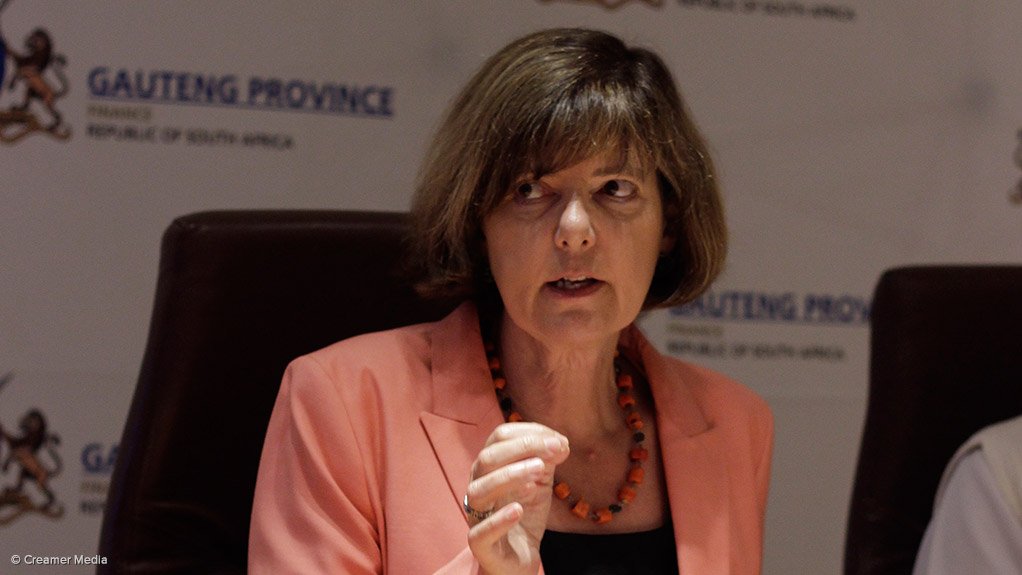The Gauteng provincial government (GPG) announced on Tuesday that South African banking firm First National Bank (FNB), a division of First Rand Bank, had been reappointed to manage the multibillion-rand centralised banking services account for the province for the next five years.
Speaking at a briefing, in Johannesburg, Gauteng Finance MEC Barbara Creecy noted that the appointment of FNB followed a successful open tender adjudication process that was completed last month.
She highlighted that the province’s budget would increase from R95.3-billion in the 2015/16 financial year to R103-billion in the 2017/18 period. FNB would manage all the banking transactions of the GPG, including the payment of R3-billion a month in salaries to 200 000 officials and suppliers.
FNB currently held the province’s centralised banking services contract, which would end in March 2016, and was able to retain its status as the provincial banker after achieving the most points using a scoring system based on the 2011 Preferential Procurement Policy Regulations, Creecy explained.
According to this evaluation criterion, points are allocated in terms of price, functionality and broad-based black economic-empowerment (BBBEE) credentials to determine the appointment of suitably qualified service providers by government in a fair, equitable, transparent, competitive and cost-effective way.
This score and other related matters were debated by the Bid Adjudication Committee (BAC), which, last month, conducted a public meeting in the presence of the bidders and interested parties. This BAC session recommended FNB as the preferred service provider, Creecy highlighted.
She stated that the BAC’s report and that of an independent probity team were forwarded to GPG Treasury department head Nomfundo Tshabalala, who, as the accounting officer, took the decision to appoint FNB in line with the recommendations of the BAC.
Tshabalala in response to a question from Engineering News Online following the briefing revealed that the amount that would be paid to FNB to administer the financial transactions of the GPG would be dependent on the amount of transactions undertaken; however, the province estimated it would pay about R20-million a year to the bank for its services.
She also noted that FNB had committed to implementing several key initiatives including investing R200-million through an existing social responsibility fund, the Vumela Fund, to support the development of township enterprises and enable a working partnership with the Gauteng Enterprise Propeller to assist in the incubation of start-up companies.
Tshabalala added that FNB would assist small, medium-sized and microenterprises with online applications for EmpowerDex BBBEE certification at discounted rates, online interface to obtain tax clearance certificates and automated registration for value-added tax.
Additionally, Creecy said FNB would provide corporate and commercial banking services, which included free training and development of GPG officials in all spheres of financial services as required by the province.
“We will ensure that this partnership assists with our programme of township revitalisation by availing financial and nonfinancial assistance to small business owners. We also want to work with FNB to increase the financial literacy of government employees,” she explained.
FNB public sector banking CEO Danny Zandamela stressed that the appointment was a “great honour and privilege for the bank” and one which brought with it great expectations.
“We look forward to facilitating and enabling the GPG to achieve its objectives,” he stated, adding that FNB admired the GPG for being forward thinking and pioneering the first open tender process in South Africa.
This is the fifth time that the province has gone to the market to procure a banking service provider.
Meanwhile, Creecy said the banking contract concluded the open tender pilot process of the GPG. The first project of the open tender process was the awarding of a R96-million contract for the upgrading of Cedar road, in Sandton, Johannesburg, to local construction company Power Construction, in April.
Construction on the Cedar road started in June and was set to be completed by the end of February 2016.
“The Gauteng Treasury will recommend to the Provincial Executive Council that the next phase [of the open tender process] involve implementing the system in more than 20 key projects valued at more than R50-million each by the end of the current financial year throughout all provincial departments.
“We believe this will go a long way towards restoring public confidence in the government procurement system,” Creecy said.
The open tender pilot process was launched in November 2014. Its aim is to improve transparency in the provincial government’s tendering process in line with the Public Finance Management Act.
EMAIL THIS ARTICLE SAVE THIS ARTICLE
To subscribe email subscriptions@creamermedia.co.za or click here
To advertise email advertising@creamermedia.co.za or click here











